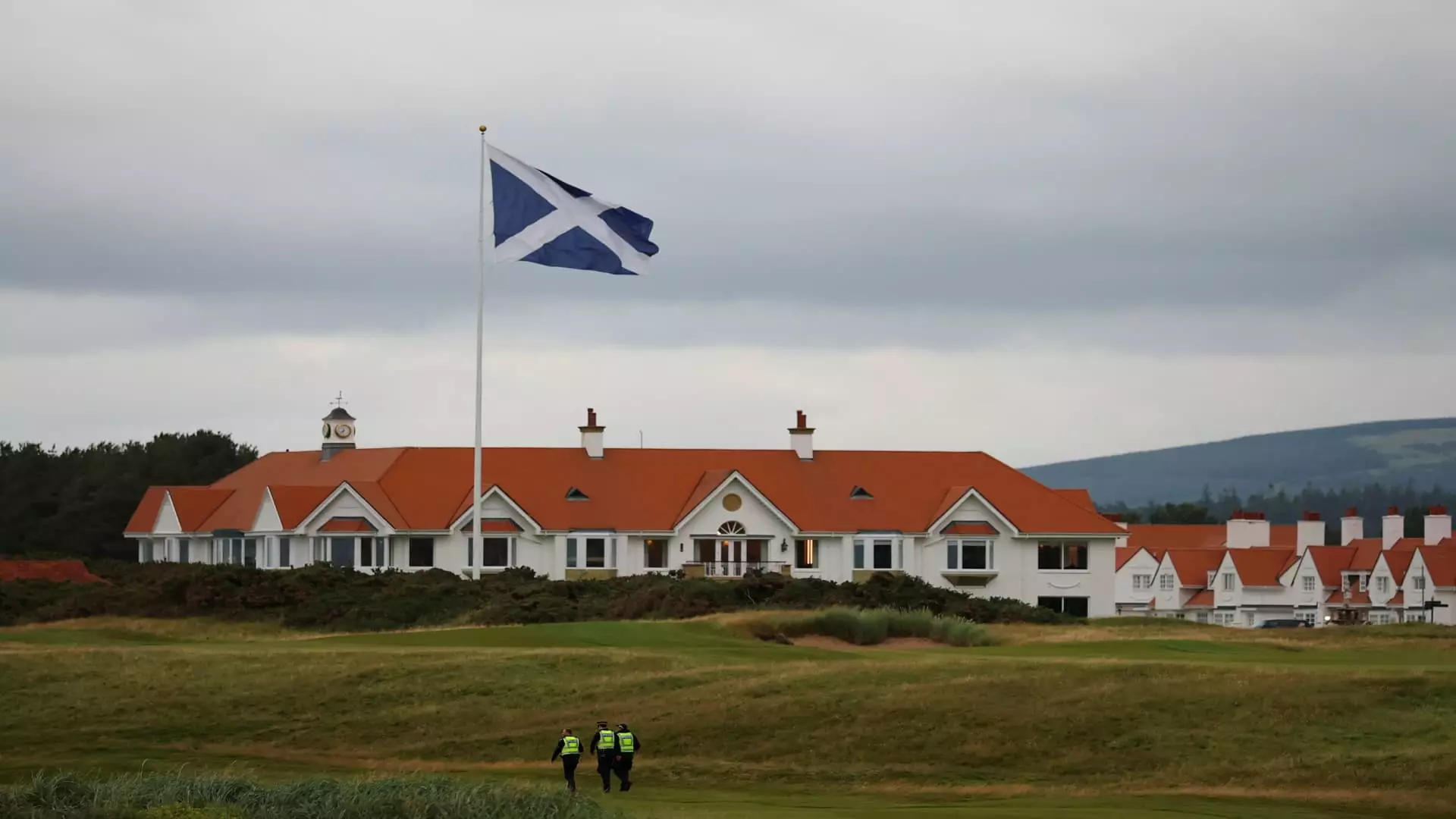Donald Trump’s latest sojourn to Scotland epitomizes his persistent pursuit of global influence amid mounting doubts about his leadership and legacy. This trip is more than a personal vacation; it is an explicit attempt to project strength, leverage international diplomacy, and shape economic negotiations at a critical juncture. Despite the controversies surrounding his administration and personal life—particularly the vexing Epstein scandal—Trump seems intent on rallying support, both domestically and abroad, by emphasizing his negotiating prowess and international stature. His arrival amidst cheers and protests encapsulates the polarizing nature of his presidency, with supporters eager to see him as a master deal-maker and opponents branding his presence as divisive and out of touch.
Yet, Trump’s decision to blend leisure activities—visiting golf properties—with high-stakes diplomatic meetings reveals a complex strategy. On the one hand, it underscores his tendency to intertwine personal branding with political maneuvering. Golf courses have long served as symbols of wealth and power, and for Trump, they are both personal retreats and venues for building informal diplomatic ties. This duality raises questions about the seriousness with which he approaches critical international affairs, particularly trade negotiations with the EU and issues surrounding the ongoing Ukraine conflict or Middle Eastern crises.
The Trade Deal: Promise, Provocation, and Paradox
Central to Trump’s Scottish visit is his pursuit of a major trade agreement with the European Union—a move that could significantly reshape international economic dynamics. touting a possible 50-50 chance of sealing this deal, Trump frames it as a historic milestone that would eclipse previous agreements. Yet, beneath the surface lies a web of uncertainties: “sticking points,” unresolved issues, and the threat of escalating tariffs. His focus on these negotiations indicates an overriding desire to reorder the global economy according to his ‘America First’ ideology, even if it risks provoking retaliation, inflation, and economic instability.
From a liberal perspective, however, this approach reveals a disturbing disregard for the broader benefits of multilateral cooperation and stable international institutions. Trump’s tariffs and threats to impose steep tariffs—up to 30% on EU goods—bypass diplomatic engagement, favoring disruption over diplomacy. While the rhetoric of reducing deficits and increasing revenue appeals to a nationalist narrative, it obscures the potential to deepen economic divides, inflate prices for consumers, and undermine long-term global economic stability. The focus on short-term gains and symbolic deals risks neglecting the intricate web of interdependence that characterizes modern trade.
Domestic Politics and International Distraction
Trump’s Scotland trip also functions as a distraction from his growing legal and political troubles at home. The Epstein scandal continues to haunt him, with critics and some of his loyalists questioning the transparency of his previous associations. His dismissive remarks—urging the press to “talk about Clinton”—are symptomatic of a strategy that seeks to deflect scrutiny by shifting the focus elsewhere. However, this tactic offers only a fleeting respite; as polls suggest, a majority of Americans remain skeptical, believing the government is hiding critical facts about Epstein’s case.
This strategic misdirection reflects a deeper reckoning within Trump’s base—one that is increasingly fractured—yet it also exposes a vulnerability. The attempt to minimize the scandal’s significance without addressing underlying concerns may alienate moderates and independents who are growing tired of relentless scandal-mongering. For a leader positioning himself as a deal-maker and statesman, maintaining credibility in both domestic and international arenas hinges on future transparency and accountability—areas where Trump’s current posture appears increasingly fragile.
Leadership in a Fragmented World
This Scottish visit also underscores the broader challenges facing center-leaning liberals amid rising global crises. While Trump seeks to dominate headlines with trade conflicts and personal scandals, issues like the ongoing war in Ukraine and the humanitarian tragedy in Gaza demand serious attention and multilateral cooperation. Both British Prime Minister Keir Starmer and EU leaders recognize the importance of diplomacy and partnership in addressing these crises—yet Trump’s confrontational style undermines efforts for cohesive international action.
For center liberals, this trip exemplifies the importance of pragmatic diplomacy rooted in shared values—justice, human rights, and international stability. While Trump’s approach is transactional and often divisive, liberals must advocate for a balanced strategy that promotes fair trade, respects sovereignty, and reinforces global alliances. The risks of allowing populist and nationalist rhetoric to dominate foreign policy are profound, potentially leading to increased tensions, economic insecurity, and a weakened commitment to democratic principles worldwide.
The Contested Legacy and the Future
Ultimately, Trump’s Scottish excursion reveals a complex interplay of personal branding, geopolitical strategy, and domestic political calculation. His frequent visits to Scotland, coupled with plans for a second state visit later this year, underscore an attempt to craft a lasting legacy—one rooted in strength and spectacle. However, the pervasive skepticism, both locally and globally, calls into question whether his approach is sustainable or merely a superficial display.
Balancing international diplomacy with the realities of a deeply divided political landscape challenges supporters and opponents alike. For center-leaning liberals, it is crucial to advocate for policies that prioritize stability, multilateral partnerships, and social justice—values that are increasingly at risk when populism and unilateralism dominate political discourse. As Trump’s influence persists, the path forward necessitates a nuanced commitment to rebuilding trust, fostering cooperation, and resisting the temptation of divisive tactics packed in grandiose displays.

